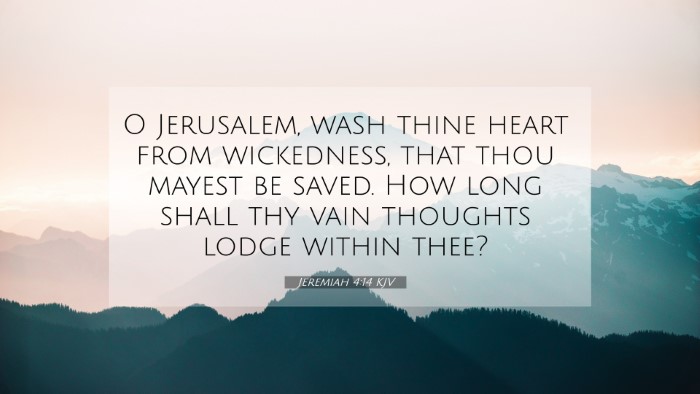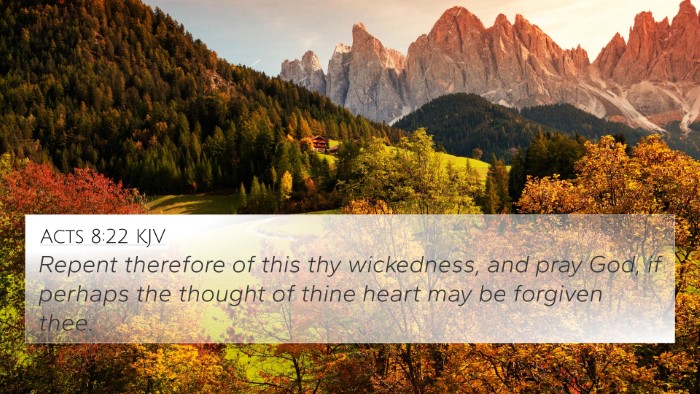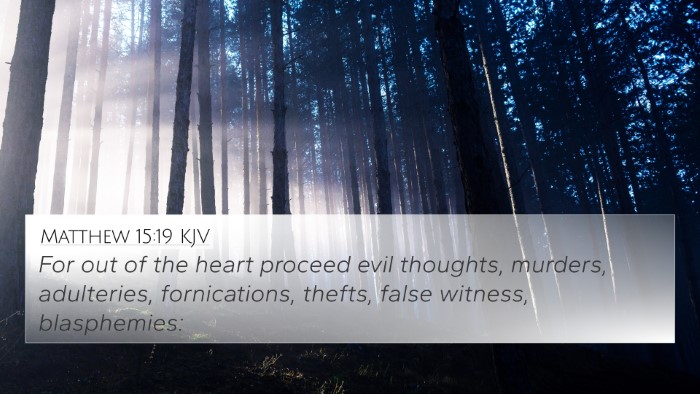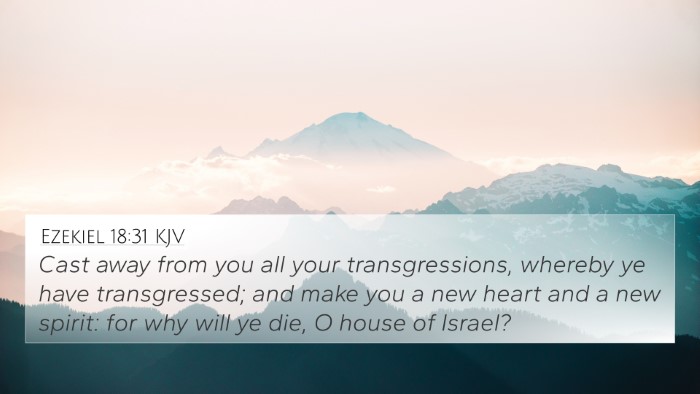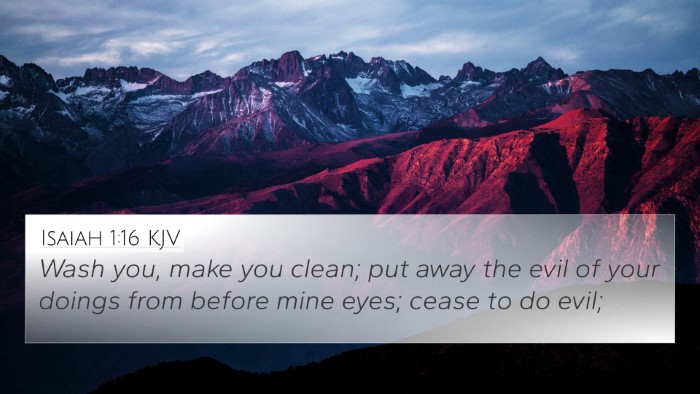Understanding Jeremiah 4:14
Jeremiah 4:14 states:
“O Jerusalem, wash your heart from wickedness, that you may be saved. How long shall your vain thoughts lodge within you?”
Summary of Meaning
This verse is a powerful call to repentance and self-examination. It urges the people to cleanse their hearts from sinfulness and to confront the frivolous thoughts that occupy their minds. The overarching theme reflects God’s desire for His people to turn away from corruption and towards righteousness.
Insights from Public Domain Commentaries
Matthew Henry's Commentary
Matthew Henry emphasizes the need for internal purification. He points out that simply washing externally is insufficient; true cleansing must occur in the heart. Henry further notes that the plea to “wash your heart” indicates repentance and personal responsibility in turning away from sin. He associates this with spiritual renewal and highlights that God desires authenticity over mere outward observance.
Albert Barnes' Notes on the Bible
Albert Barnes elaborates on the imagery of washing, interpreting it as a metaphor for a sincere acknowledgment of one’s sinful state. He stresses that God calls His people not only to abandon their external idolatry but also to rid their hearts of deceitful and empty thoughts. Barnes connects this verse to the broader biblical theme of the necessity of inner transformation for true salvation.
Adam Clarke's Commentary
In his commentary, Adam Clarke highlights the emotional urgency in the prophet’s words. He views Jeremiah's exclamation as an appeal to the people’s conscience. Clarke notes that “vain thoughts” can lead individuals away from their relationship with God, correlating this verse with the broader messages found in both the Old and New Testaments, urging consistency in faith and practice.
Thematic Connections
This verse resonates with multiple themes throughout Scripture, specifically the call to repentance and the need for spiritual renewal. Below are significant cross-referenced verses that provide deeper insights:
- Proverbs 4:23 - “Keep your heart with all diligence, for out of it spring the issues of life.”
- Matthew 5:8 - “Blessed are the pure in heart, for they shall see God.”
- James 4:8 - “Draw near to God, and He will draw near to you. Cleanse your hands, you sinners, and purify your hearts, you double-minded.”
- Psalm 51:10 - “Create in me a clean heart, O God, and renew a right spirit within me.”
- Ezekiel 18:30 - “Therefore I will judge you, O house of Israel, everyone according to his ways, says the Lord God. Repent, and turn from all your offenses, so sin will not be your downfall.”
- 1 John 1:9 - “If we confess our sins, He is faithful and just to forgive us our sins and to cleanse us from all unrighteousness.”
- Romans 12:2 - “And do not be conformed to this world, but be transformed by the renewing of your mind...”
Key Takeaways
Jeremiah 4:14 serves as a profound reminder of the necessity of genuine repentance and heart transformation. The call to “wash your heart” invites believers to continually assess and purify their inner lives, leading to salvation and righteousness.
Exploring Related Themes Through Cross-Referencing
The importance of heart condition in accordance with God's will is a recurring theme in the Bible. Engaging in rigorous cross-referencing of biblical texts can lead to enhanced understanding of interconnected themes such as:
- Repentance: 2 Chronicles 7:14, Acts 3:19
- Spiritual Renewal: Isaiah 40:31, 2 Corinthians 5:17
- The Nature of Thought: Philippians 4:8, Colossians 3:2
Through these comparative analyses, one can identify the connections between Bible verses that elaborate on the imperative of inner change, illuminating paths for deeper Bible verse understanding.
Conclusion
The verse Jeremiah 4:14 encapsulates a critical moment of divine exhortation. It asks its audience to embrace introspection and pursue a heart aligned with God. In using Bible verse cross-references, one gains a comprehensive grasp of biblical teachings on repentance and purity.
Further Study Recommendations
For those interested in Bible cross-reference study, consider utilizing tools like a Bible concordance or Bible reference resources. These tools can aid in identifying connections between Old and New Testament, and provide a structured approach to understanding the inter-Biblical dialogue present in the scriptures.


